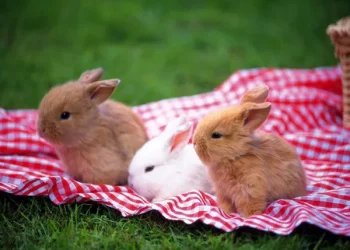Rabbits, often adored for their charming personalities and gentle demeanor, require careful attention to their daily routines to ensure they lead happy, healthy lives. A well-rounded routine encompasses diet, exercise, grooming, social interaction, and mental stimulation. Understanding and implementing these aspects can transform a rabbit‘s life, fostering a sense of security and well-being. In this comprehensive guide, we’ll explore each element of a good routine for rabbits, providing insights grounded in veterinary science and practical experience.
Understanding Rabbit Behavior and Needs
Rabbits are prey animals with specific evolutionary traits that influence their daily needs. Their natural behaviors include foraging, burrowing, and social interaction. To replicate their natural environment as closely as possible, it’s crucial to provide a routine that mimics these behaviors.
Social Structure
In the wild, rabbits live in groups known as colonies. They are social animals that thrive on interaction with both their kind and their human companions. A solitary rabbit can become lonely and stressed, which can lead to health problems. Incorporating regular social interaction into their routine is essential.
Foraging Instincts
Rabbits spend a significant portion of their time foraging for food. This instinct can be fulfilled through a varied diet and enrichment activities that encourage natural foraging behaviors.
Daily Diet and Nutrition
A rabbit’s diet is fundamental to its health and happiness. A good routine includes not just what rabbits eat but also when and how they eat.
Hay
Hay should be the cornerstone of a rabbit’s diet. High-fiber hay like timothy, orchard grass, or meadow hay supports digestive health and prevents obesity. Rabbits should have unlimited access to hay at all times.
Fresh Vegetables
Fresh vegetables provide essential vitamins and minerals. A variety of vegetables should be offered daily. Suitable options include leafy greens like kale, romaine lettuce, and cilantro. Carrots and bell peppers can be given in moderation due to their higher sugar content.
Pellets
Pellets should be high in fiber and low in calcium to prevent obesity and kidney issues. Offer a small amount of pellets daily, adjusting the quantity based on the rabbit’s age, weight, and health status.
Fresh Water
Always provide fresh, clean water. Water should be changed daily to prevent contamination and encourage hydration.
Exercise and Play
Rabbits are energetic animals requiring ample exercise to maintain their health. A good routine includes opportunities for physical activity and mental stimulation.
Exercise Space
Rabbits need a large, safe space to run and play. Ideally, they should have a playpen or a room where they can explore freely. Exercise areas should be rabbit-proofed to prevent accidents or ingestion of harmful items.
Toys and Enrichment
Provide a variety of toys to keep your rabbit entertained. Chew toys, tunnels, and cardboard boxes can mimic natural behaviors like chewing and burrowing. Rotate toys regularly to maintain interest and engagement.
Interactive Play
Spend time interacting with your rabbit through games and training. Simple tricks and commands can provide mental stimulation and strengthen your bond with your pet.
Grooming and Health Care
Regular grooming and health care are essential components of a rabbit’s routine. They help prevent health issues and ensure your rabbit remains comfortable and clean.
Brushing
Depending on the breed, rabbits may require regular brushing to prevent matting and reduce shedding. Long-haired breeds, such as Angoras, need more frequent grooming compared to short-haired varieties.
Nail Trimming
Nails should be trimmed regularly to prevent overgrowth, which can cause discomfort and mobility issues. Check nails every 1-2 weeks and trim as needed.
Dental Care
Rabbits have continuously growing teeth that need to be worn down through chewing. Providing hay and chew toys helps maintain proper dental health. Regular check-ups with a veterinarian are important for monitoring dental health.
Health Monitoring
Routine health checks are crucial for early detection of issues. Monitor your rabbit’s weight, eating habits, and behavior. Changes in these can indicate health problems that may require veterinary attention.
Litter Training and Hygiene
Maintaining cleanliness in your rabbit’s living area is important for their health and comfort.
Litter Box
Most rabbits can be litter trained with patience. Use a large, shallow litter box with a rabbit-safe litter. Avoid clay-based or clumping litters, as they can be harmful if ingested. Place the litter box in a corner where the rabbit naturally urinates.
Cleaning Routine
Clean the litter box daily to prevent odor and bacterial growth. The entire living area should be cleaned regularly, including sweeping or vacuuming to remove fur and debris.
Social Interaction and Bonding
Rabbits are social creatures that benefit greatly from human interaction and companionship.
Daily Interaction
Spend time with your rabbit daily. This can include gentle petting, talking, and simply being present. Regular interaction helps to build trust and reduces stress.
Bonding Activities
Engage in activities that strengthen your bond. This could be through playtime, grooming, or training sessions. Positive reinforcement, such as treats and praise, can help build a strong, trusting relationship.
Creating a Safe and Enriching Environment
A rabbit’s environment significantly impacts their well-being. Ensuring it is safe, stimulating, and comfortable is key.
Housing
Rabbits need a secure and comfortable living space. Whether housed indoors or outdoors, the area should be well-ventilated, free from drafts, and protected from extreme temperatures. Indoor rabbits should have access to a spacious, rabbit-proofed area for exercise.
See Also: What is a High Protein Snack for Rabbits?
Enrichment
Incorporate elements into your rabbit’s environment that provide mental stimulation. This includes items like tunnels, climbing structures, and areas for digging. Variety is important to keep the environment engaging.
Safety
Ensure the living space is free from hazards such as electrical cords, toxic plants, and small objects that could be swallowed. Regularly inspect the area for potential dangers.
Recognizing and Responding to Stress and Health Issues
Understanding how to recognize signs of stress or illness is vital for maintaining your rabbit’s health.
Signs of Stress
Common signs of stress include changes in behavior, reduced appetite, and excessive hiding. Stress can be caused by changes in environment, lack of social interaction, or health issues.
Health Issues
Watch for symptoms such as diarrhea, lethargy, or difficulty breathing. Any changes in behavior or health should prompt a visit to the veterinarian. Regular check-ups and vaccinations (if applicable) help prevent and manage health issues.
Understanding Age-Related Needs
Rabbits’ needs can vary depending on their age. Adjust their routine to accommodate changes as they grow older.
Young Rabbits
Young rabbits (kits) require extra care, including a diet rich in nutrients to support growth. Socialization during this period is crucial for developing a well-adjusted adult rabbit.
Adult Rabbits
Adult rabbits generally have stable routines but may require adjustments in diet and exercise based on their health and activity levels.
Senior Rabbits
Older rabbits may have specific health concerns, such as arthritis or dental issues. Adjust their routine to ensure comfort, including providing softer bedding and more accessible food and water.
Conclusion
Creating a good routine for a rabbit involves understanding their natural behaviors, providing appropriate diet and exercise, ensuring regular grooming, and fostering social interaction. By paying attention to these aspects, you can ensure that your rabbit leads a fulfilling and healthy life. Regular veterinary care and a proactive approach to health and well-being will help keep your rabbit happy and thriving throughout their life.
Incorporate these practices into your rabbit’s daily routine, and you’ll be rewarded with a happy, healthy, and well-adjusted companion.
Related Topics:



























